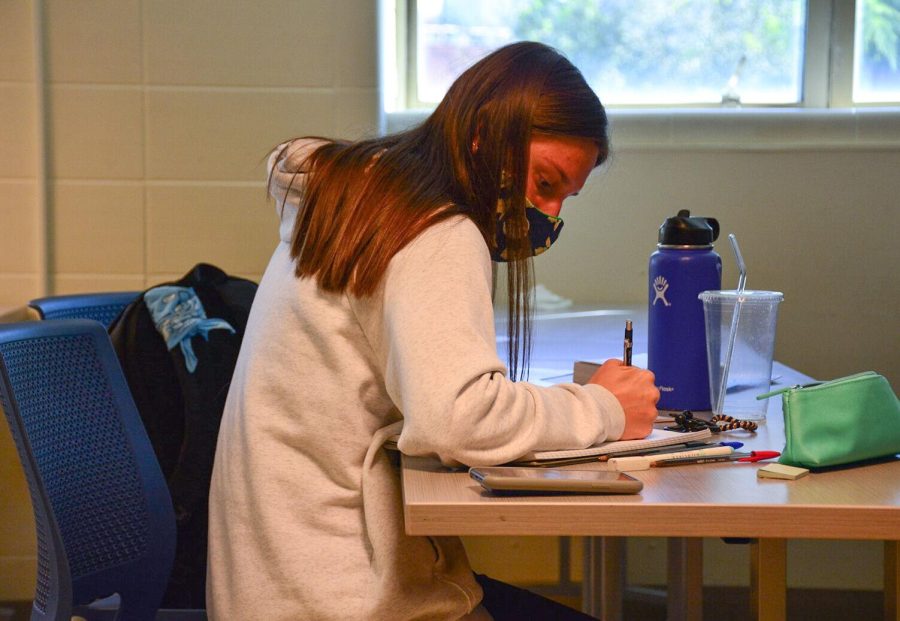History of Race Course Soon To Be Required
September 8, 2021
The fiery racist roots of this nation have spread not only in this country for many years, but also on Villanova’s campus, making the newest addition to the curriculum a step forward into a better future. We have witnessed racist practices for far too long, not just in our nation’s history, but in our campus’ history as well. To bring the University one significant step closer to a community-wide practice of antiracism, the school has created a new University Race and Justice Course (URJC): History of Race.
History of Race is currently taught by Hibba Abugideiri and Sherry Bowen. Because this course will eventually become a requirement for all Villanovans, students have many questions. Therefore, Abugideiri has answered these questions and shared her thoughts on the progress the URJC has made so far.
The Villanovan: How did this course come to be? What was that process like?
Hibba Abugideiri: The URJC is one of the recommendations put forth by Aequitas: Presidential Task Force on Race that Father Peter established in July of 2020, in the aftermath of the George Floyd murder and the consequent protests for social justice, which included some powerful social media posts by Black Villanovans,” Abugideiri said. “The Task Force sent Father Peter its report this past summer in which the Steering Committee recommended a wide-ranging set of recommendations that cross all aspects of university life. We were beyond thrilled that Father Peter, Provost Maggitti, Dean Lindenmeyr and Chair Gallicchio all supported the URJC pilot and agreed to make it happen by this fall. We are grateful for their support.
Furthermore, Abugideiri added, “Dr. Terry Nance, Dr. Sherry Bowen, and I, as the co-chairs of the Aequitas Subcommittee on the URJC, along with the committee members, designed an incredibly innovative course during the Spring 2021 semester as well as this summer. We were very intentional about designing it as a course on antiracism that includes a dialogue component to give students space to process their thoughts and feelings.”
Bowen is the course “Dialogue Expert Facilitator,” who is there to lead students through the dialogue experience. Abugideiri is the primary instructor.
“We are very excited to see how students respond to the design and the antiracism content,” she shared.
TV: What does this course entail?
HB: The course is a university-wide requirement that will have iterations offered through each college of the University. Ideally, students will be able to take an iteration in the college of their major or area of interest. The idea here is that the course will offer some universal content on race that will be included in all iterations of the course, regardless of college. This universal content is comprised of the foundational modules regarding race and the dialogue component. We not only wanted all Villanovans to have a shared experience as Villanova students, but we also wanted to anchor that experience in learning how to engage in questions of identity and power, so that students are better equipped to have those difficult conversations about race and difference.
TV: Is this course now a requirement for all Villanova students?
HB: We plan to scale the URJC so that in the next few years, it will be required of all Villanovans. This will be a gradual process since requiring a university-wide course is a very complex process that involves a lot of moving parts, starting with how the course will fit in the different curricular requirements of each college.
TV: Does this course fulfill any other requirements?
HB: Currently, the course is being run as a pilot through the History Department and it fulfills the Diversity 1 and Diversity 2 requirements. It also carries Peace and Justice (P&J) and History (HIS) attributes. Future iterations may carry different attributes and fulfill other requirements.
Students who are currently enrolled in the pilot course are finding the work they are doing to be invaluable.
Senior Ivanica Skalko, Vice President of the Student Body, is a student in the URJC.
“I am really excited to take this class, because it provides a space for dialogue and learning that I have not experienced before at Villanova, or any other part of my educational experience,” Skalko said.
Tee Parris, a Senator of the Class of 2024, also shared why she enrolled in the course.
“Diversity, Equity, and Inclusion (DEI) work that I have previously been able to participate in has existed at a personal and theatrical level,” Parris said. “The opportunity to work at a systematic level is what I think is most powerful about not only this pilot course, but also the sections to follow.”
Additionally, as Abugideiri pointed out, this class requires students to have difficult but necessary discussions about racism and inequality, in broader terms and relating to life at Villanova.
“The course is exceeding my expectations in most ways, but is unsettling to me in other ways,” Parris shared. “However, I know that is the point of this course.”
Skalko also described the thoughts and feelings of the URJC students.
“It’s scary being vulnerable and going through the process of learning new things about the institution I hold close to my heart and unlearning all the incorrect things I have been taught about Villanova and its history thus far,” she said. “I am so grateful for the opportunity to shape this class so that one day, all Villanova students can experience it.”
“I could not have asked for a better class of students,” Abugideiri said. “They are extraordinary. It has been rewarding to watch the many ‘aha’ moments that happen in class and to hear how they are wrestling with difficult content and questions. They are really leaning in so far.”
By taking this URJC and courses like it, the hope is to be more aware and educated about the issues surrounding race. For the Villanova community, the class will help in becoming what we are not yet.












